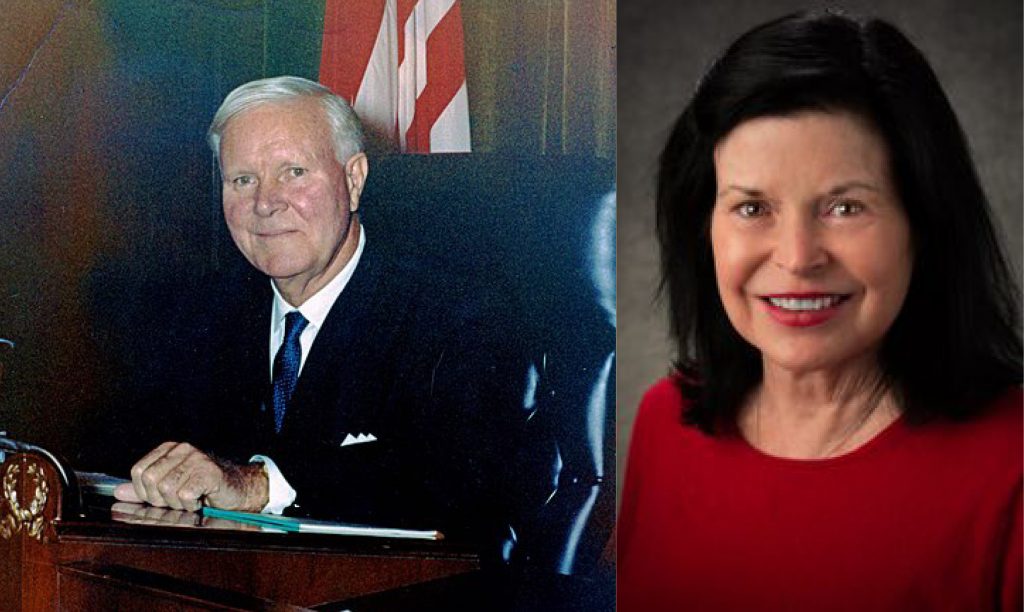Charleston, W.V. — This year marks the 40th anniversary of the passage of a policy critical to freight railroads. Named for its author Rep. Harley Staggers of West Virginia, the Staggers Rail Act of 1980 remains one of the most successful, bipartisan pieces of legislation enacted by Congress.
While Rep. Staggers, who served in Congress from 1949-81 and wrote the legislation while on the House Committee on Interstate and Foreign Commerce, passed away in 1991, his legacy lives on. In honor of his namesake legislation’s 40th anniversary, GoRail spoke with Rep. Staggers’s daughter, Dr. Margaret Staggers, who has served as a West Virginia delegate representing District 32 since 2018 and previously represented District 32 from 2006-14.
Dr. Staggers’s unique relationship to the history and success of America’s freight railroads provides a window into her father’s motivations, philosophies, and strategies for tackling one of the most lasting and impactful pieces of transportation policy in American history.

GoRail: Would you tell us more about your father’s connection to freight rail at the time? How and why did he become interested in freight rail policy?
Dr. Staggers: Two [memories] about my father from being very, very young: He did work on the railroad. He was what was called a ‘caller.’ It was going to the engineer’s house and knocking on the door. I think the railroad people back then called it ‘knocking up.’ He frequently knocked on Luke Casey’s door, or the side of the house, and that’s when his to-be future wife Mary Casey used to answer the door to make sure her father got up. So Dad worked on the railroad and had some understanding of what it was like to be an employee.
An interesting thing was that Dad really didn’t want to be on the Interstate and Foreign Commerce Committee. He was focused on veterans’ issues because he was a Lieutenant Commander in World War II. But Speaker [Sam] Rayburn insisted that he get on the committee and then my father became chairman and was able to actually guide and lead the legislation having to do with the railroads.
He didn’t give up. He knew the railroads needed this [legislation] and he kept after it. He told every one of his children and frequently repeated to others: ‘On the plains of hesitation lie the bones of countless millions that on the eve of victory laid down to rest and in resting died.’ I think that’s why the legislation actually carries his name. Everyone in the Senate, and the House, as well as the President, knew that Harley was going to be there saying: ‘Well what can we do to get this stuff done? How will we get this done?’ every day until it was done.
He was humble though, and so quiet, and he was a deeply religious man.
I think a big thing was this bill. He wanted to keep the railroads competitive and to protect them.
GoRail: You mentioned that your father served in the military. Railroads have long been partners to military operations and have made veteran hiring a priority over the last several decades. Was this relationship important to him or something he was aware of back then?
Dr. Staggers: I think he was aware of that. His whole emphasis was the Great Generation—they made America, and the world. So I know that his compromising and his talking to people, it was the mentality that ‘This is for the veterans because everyone is home from the war and we’ve got to get this done.’ He was proud of being a veteran. You know there were a lot of veterans in Congress back then who had fought in the war. So yes, he saw jobs, service to your country, and saving the railroads all in one sense.
GoRail: What were some of the goals your father was trying to achieve for America’s freight railroads?
Dr. Staggers: The main one was to tie this whole nation together. The Interstate highways were also one of his big pushes so that everyone could actually feel like there was nothing strange about a California strawberry, or a Florida orange, or a West Virginia apple, or West Virginia steel. Everything was just ‘this is American’—this isn’t some unknown country that these products are coming from.
You’re talking to someone who’s old now (laughs). Once a year people would bring oranges from Florida and we would get oranges in our stockings, and it was like, ‘Wow, a real orange!’ It was rare back then, but the whole idea of infrastructure, tying everyone together, and now of course with the Internet and all the other ways that we’re talking, that was just another dream of his.
GoRail: What was your father’s political strategy for gaining support for this legislation? How important a factor was bipartisanship?
Dr. Staggers: He used two strategies. He started with the working people in the unions to have them put pressure on their elected representatives. He then [harnessed] the bipartisanship back in the day.
Congressman [Samuel] Devine was the minority chair of Interstate and Foreign Commerce. His daughter is Carol Miller, she’s now a Congresswoman from West Virginia. Congressman Devine and my father were best friends. They would actually sit down together. The very fact that you were Republican or Democrat [didn’t matter]. He knew there were some people who weren’t working for the common good, but he also knew that almost everybody understands. He was very, very nonpartisan in this. He reached out to the working people to put pressure on their representatives so they would know how important this [legislation] was.
GoRail: Was there any feeling that he or you had—as you would have been just getting your career started at this point—that this legislation would be as impactful as it has proven to be? What did he foresee?
Dr. Staggers: When it passed [in 1980], I was in San Francisco. There was this headline ‘Staggers!’ (laughs). This big two-inch headline: ‘Staggers Bill Passes.’ I was doing an externship for medical school, and people would say, ‘Is that your father? Do you know this person?’ and I would reply, ‘Yeah, that’s my father.’ So, I think the whole nation realized the impact at that time.
It was a good thing, but I don’t think anyone sitting at that level—not being able to stand on people’s shoulders and see the future—could understand how important that [legislation] has been to America. The expectation at that time was: ‘Save jobs and save the industry.’
Things will change, rail may become more important—I certainly know that he was invested also in passenger rail. That was something that he foresaw too, that everyone could get on a train and get coast to coast or wherever they needed to go. And he foresaw high speed rail. If you’re going to, why don’t you move people in an economical, competitive way, so that you’re giving the best service to the people and using all the facilities of the government to stay out of the way of progress.
That’s the man. And I couldn’t possibly match his footprints. Anything else though is just to try and imitate someone that I admire so much. It’s bringing history into the present and realizing that we are just a continuation.


